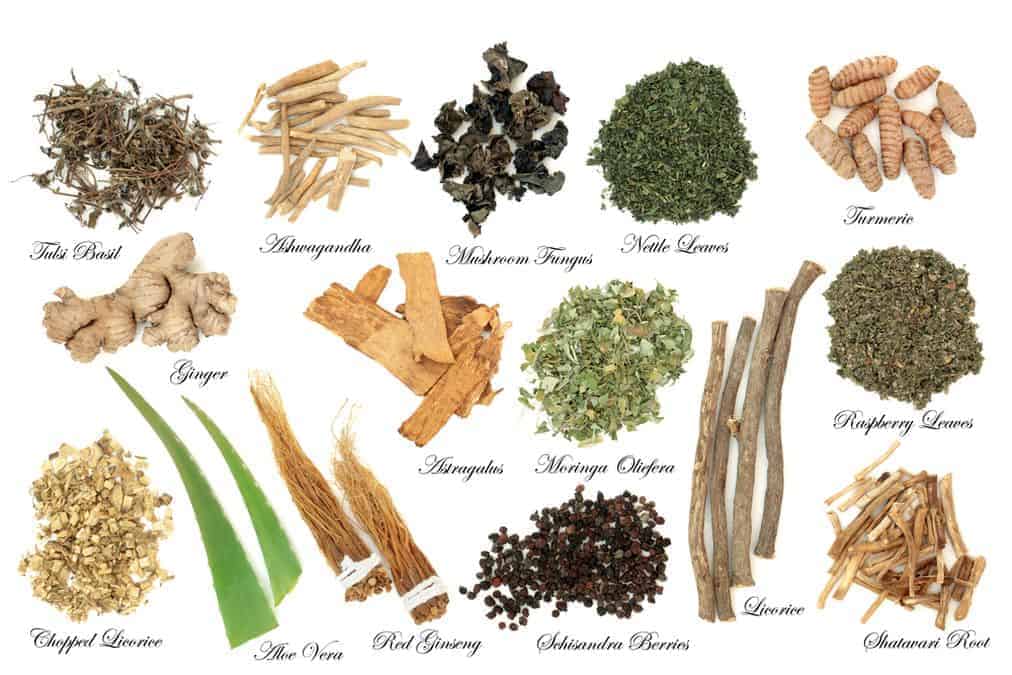
Adaptogens – what are they and how do they affect the human body?
Non-conventional medicine uses numerous natural methods based primarily on the healing effects of many herbs and other plants to support weakened health. Some of them have a particularly beneficial effect on the human body, we can say that they adapt to the specific conditions in which they are supposed to act, so we call them adaptogens. There are many of them, so it is worth finding outwhat properties they have and which ones we should start using.
Contents
What are adaptogens?

The concept of adaptogens has already permanently entered the vocabulary of not only supporters of natural medicine in general and a holistic approach to health. Their mechanism of action still has many mysteries for us, but as we learn more about them, we already know that their effectiveness and positive health-promoting properties cannot be faulted much. The name was first used in 1940, when a Russian scientist studied the effects of certain plant species on strengthening the body weakened for various reasons.
The current and generally accepted definition defines adaptogens as plants whose function is to regulate and normalize the functioning of the body. They primarily strengthen our immunity to the negative effects of stress, which we sometimes find difficult to cope with, and can lead to the development of many more or less serious diseases. The action of plants with adaptogenic properties allows us to better and faster adapt to all changing external conditions, with simultaneous reduction of the effects of the damage already caused by them.
What medicinal properties of adaptogens are particularly worth highlighting?
Phytotherapy, or herbal medicine, has been known to mankind for thousands of years, and we also use various plants and herbs today to alleviate the symptoms of many ailments. However, we should know that not all plants can be classified as adaptogens. They should be characterized by relatively specific properties, and must not, among other things, be addictive, interact with drugs, contain dangerous toxic compounds that can harm rather than help, and cause side effects.
If we do not know which plants meet these conditions, we can always consult a specialist, for example, in an herbal store. It is also worth learning about all the important properties of adaptogenic plants, beneficially affecting numerous aspects of health, the most important of which are:
- normalization of the functioning of virtually the entire body, all its internal organs and systems, action at the cellular and hormonal level;
- strengthening natural immunity, stimulating the immune system;
- antioxidant action, protecting cells from the negative effects of oxidative stress caused by excess free radicals;
- more efficient cleansing of toxins and unnecessary residues from metabolic processes;
- Improved functioning of the brain and nervous system, enhancing memory, concentration and cognitive function;
- faster regeneration of the body, both after major exertion and after illness;
- Increased resistance to stressful situations, calming effect on jittery nerves and improving mental mood;
- improving the quality of sleep, making it easier to fall asleep and cope with insomnia;
- increasing resistance to the impact of adverse external stimuli, primarily noise, also likely to lead to an increase in stress levels;
- improving the health and appearance of the skin, faster renewal of its cells, inhibition of natural aging processes;
- anti-inflammatory, antifungal and antiviral activity, allowing to cope with many dangerous infections of various origins.
Which adaptogens are worth having in your home herbal medicine cabinet?
Now that we know what adaptogens are and their properties that benefit our health, it’s time to find out which are the most effective and definitely worth having in your home herbal medicine cabinet. Specialists in the field advise the use, first of all, of such six natural plant-based adaptogens as:
Ashwagandha

Bearing the Latin name Withania Somnifera, also known in our country as sluggish vitania or Indian ginseng, by far the most highly regarded and most widely used adaptogen in the world. In the wild, ashwagandha grows in the Far East, primarily in India, and is classified as a plant of the solanaceous family. It has been used for nearly 5,000 years, primarily the powdered root, added to numerous dietary supplements, and its unique properties are due to the plant’s composition.
Among other things, it contains active biological compounds called vitanolides, vitamin C, phytosterols, flavonoids, numerous alkaloids, carotene, coumarins, saponins, dietary fiber and minerals, including calcium and iron. Thanks to them, you can count on the action:
- supporting the work of the brain and other elements of the nervous system, improving memory, concentration or learning ability;
- that can reduce the risk of developing dangerous neurodegenerative diseases, Alzheimera and Parkinson’s;
- strengthening the weakened immune system;
- reducing levels of “bad” cholesterol LDL and regulating blood glucose;
- counteracting insomnia, making it easier to fall asleep and increasing the quality of sleep;
- increasing resistance to stress, made possible by lowering the amount of cortisol, or “stress hormone,” while alleviating symptoms of other nervous tensions.
Ginseng
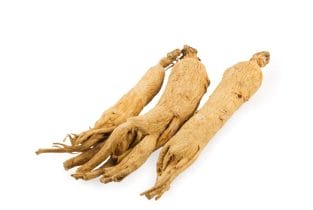
The plant with perhaps the best-known health-promoting properties, not just adaptogenic ones, although they are particularly strong in its case. Panax ginseng, for that is its Latin, scientific name, is also a wealth of numerous nutrients even essential to our body’s health. Ginseng root has in its composition, among others, vitamin B1, or thiamine, vitamin B4, or choline, vitamin C, vitamin E and ginsenosides, which has implications:
- anti-inflammatory and anti-coagulant properties;
- support of weakened natural immunity;
- maintenance of high sexual performance;
- normalization of LDL cholesterol levels in the blood and regulation of blood pressure;
- strong antioxidant activity to remove health-threatening free radicals;
- faster regeneration of the body, not only after physical, but also mental exertion, with simultaneous provision of large doses of energy;
- neuroprotective properties, enhancing memory and concentration, lower risk of Alzheimera disease.
Maca root
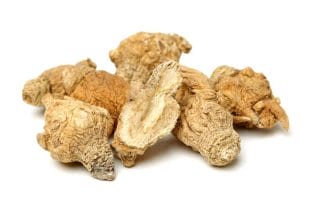
Derived from a plant that grows in the wild in Peru, at an altitude of more than 4,000,000 meters, but has been known and valued in this region of the world for centuries. Maca root, Lepidium peruvianum, also called peppergrass or Peruvian ginseng in our country, is another adaptogen worth introducing. Studies have shown that it is an exceptionally rich source of numerous bioactive substances, flavonoids, anthocyanins, saponins and tannins. These are supported by B vitamins, thiamine and riboflavin, vitamin C and E, as well as the minerals zinc, copper, potassium, calcium and iron, together giving it properties:
- antioxidant, removing accumulated free radicals in the body that can damage cells and become the cause of many dangerous diseases;
- supporting the weakened nervous system, making it better able to cope with possible stress;
- restoring good mental mood;
- enhancing memory, concentration and cognitive function;
- removing the effects of physical and mental exhaustion;
- increasing weakened libido.
Bacopa monnieri
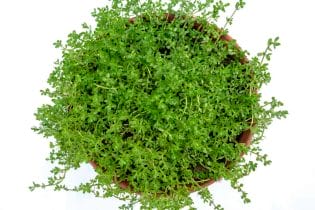
A plant that has been used for centuries in Ayurveda, or traditional Indian medicine, and belongs to the lepidopteran family, it is also called brahmi. In our country, bacopa monnieri bears the less exotic name of small-leaved bacopa, and is another adaptogen worth using regularly for more than just fighting stress. Its action is based primarily on the presence of steroidal saponins, phenols, phytosterols and flavonoids, and consists in:
- strengthening the work of neurotransmitters responsible for the transmission of nerve impulses;
- improving the ability to learn and absorb more new information by improving memory and concentration;
- antioxidant, antibacterial and anti-inflammatory effects;
- alleviating symptoms of stress, thanks to its calming, anti-anxiety and even antidepressant properties;
- supporting the immune system, heart and circulatory system.
Asian Centella
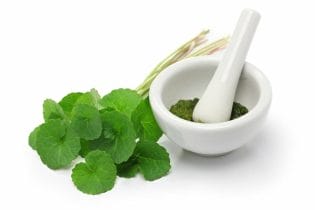
Another adaptogen used in ancient Indian Ayurveda, and its medicinal properties cannot be denied. To followers of natural medicine it is better known as Gotu Kola, and it contains, among other things, triterpene compounds, flavonoids, essential oils, phytosterols, tannins, minerals, including the much-needed magnesium. Regular use of preparations having in their composition Asian Centella, Centella asiatica, has a positive effect on:
- rapid reduction of high levels of stress;
- alleviation of virtually all its symptoms, including anxiety;
- increasing the production of the most important neurotransmitters, dopamine and serotonin;
- improving the conduction of nerve impulses;
- production of new brain cells, thereby increasing memory, concentration and cognitive function;
- less suffering from the negative effects of oxidative stress, due to the antioxidant properties of Gotu Kola;
- improved sleep quality due to its sedative effects.
Rhodiola rosea
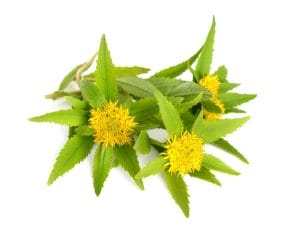
The last adaptogen that we think is worth having in your home herbal medicine cabinet is mountain rhodiola, Rhodiola rosea, which grows in the wild in cold climates, including the Arctic. Also called the “golden root,” it is increasingly grown in other parts of the world, including Poland, and boasts a composition responsible not only for adaptogenic properties. There are phytosterols, catechins, flavonoids, phenolic acids, trace elements, chromium, manganese, copper and selenium, and it is to these that rhodiola rosea owes its effects:
- antioxidant and antibacterial;
- adaptogenic, enabling it to reduce the effects of stress and lower other nervous tensions;
- improving mood and mental well-being by increasing the production of serotonin, known as the “happy hormone”;
- strengthening weakened vital forces, physical and mental endurance;
- improving cognitive abilities, memory and concentration;
- reducing blood sugar levels that are too high;
- improving the quality of sleep and reducing the effects of fatigue.
What are the contraindications that prevent the use of adaptogens?
Unfortunately, not everyone can enjoy the numerous benefits of regular use of dietary supplements containing the adaptogens mentioned above. It is necessary to carefully read the accompanying leaflet beforehand, first of all, the contraindications, and the ones you will need to take into account are:
- pregnancy and lactation;
- age under 18, and the use of such agents by children is worth consulting a specialist;
- certain cardiovascular conditions, e.g., ginseng is inadvisable for high blood pressure;
- simultaneous use of certain groups of drugs, sedatives, anti-anxiety, painkillers and antidepressants, it is imperative to read the leaflet found in their packaging;
- the infection of combining adaptogens with alcohol;
- the possibility of an individual allergic reaction.
Sources:
- https://www.healthline.com/health/stress/smart-girls-guide-to-adaptogens
- https://www.healthline.com/nutrition/ashwagandha
- https://www.healthline.com/nutrition/ginseng-benefits
- https://www.healthline.com/nutrition/benefits-of-maca-root
- https://www.healthline.com/nutrition/bacopa-monnieri-benefits
- https://www.healthline.com/health/gotu-kola-benefits
- https://www.healthline.com/nutrition/rhodiola-rosea



